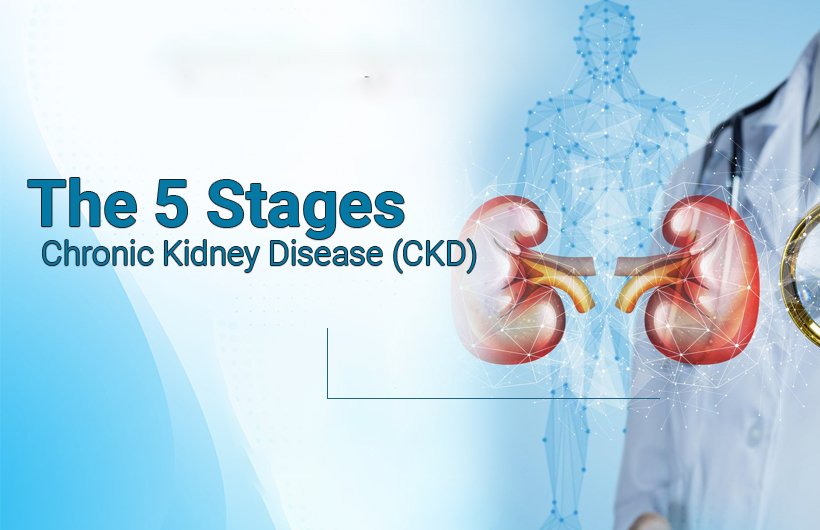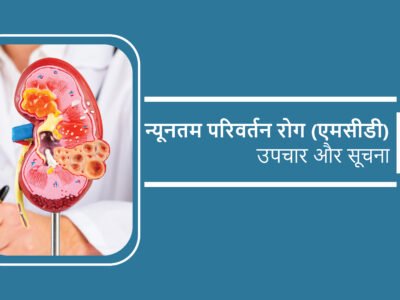Chronic Kidney Disease (CKD) is a long-term condition where your kidneys slowly stop working over time. The problem is that Chronic Kidney Disease(CKD) usually doesn’t show clear symptoms in the early stages. Most people don’t even know they have it until the damage is serious. That’s why it’s important to know about the stages of CKD and how to catch it early.
What are the Stages of Chronic Kidney Disease?
CKD is divided into five stages, and each stage tells you how well your kidneys are working. This is measured by something called GFR (Glomerular Filtration Rate).
What is GFR, and why is it Important?
GFR is a number that shows how well your kidneys are filtering waste from your blood.
- A GFR of 90 or above means your kidneys are healthy.
- A lower GFR means your kidneys are not working as well.
- The lower the number, the more serious the stage of kidney disease.
Doctors use your GFR to find out which stage of CKD you are in, so they can guide treatment and help you protect your kidneys.
Stage 1: Kidney Damage with Normal or High GFR (GFR ≥ 90 mL/min)
What’s happening:
At this stage, your kidneys are still working well, but there are early signs of damage. For example, your urine might contain protein, or a scan may show small changes in the kidneys.
Symptoms:
Usually, there are no symptoms. This stage is often found during routine checkups, especially in people with high-risk conditions like diabetes or high blood pressure.
What You Should Do:
- Keep your blood pressure and blood sugar under control.
- Get regular exercise and stay hydrated by drinking enough water.
- Eat fresh and healthy foods, and reduce salt in your diet.
- Do regular blood and urine tests to monitor kidney function.
- Avoid using painkillers (like NSAIDs) too often, unless prescribed.
Stage 2: Mild CKD (GFR = 60–89 mL/min)
There is a slight drop in how well your kidneys are working. They still function, but signs of damage are becoming more noticeable.
Symptoms:
Many people still don’t feel any symptoms, but some may start to notice:
- High blood pressure
- Swelling in the ankles
- Tiredness or fatigue
What You Should Do:
- Visit your doctor regularly for check-ups.
- Follow a kidney-friendly diet as advised by your doctor or dietitian.
- Manage health conditions like diabetes and high blood pressure.
- Stay hydrated by drinking enough water.
- Avoid smoking and alcohol.
Goal:
To keep your kidneys working well and stop the disease from getting worse.
Stage 3A: Moderate CKD (GFR = 45–59 mL/min)
Your kidney function is getting worse. At this stage, other health problems may start, like low red blood cell count (anemia), weak bones, or imbalanced minerals in your body.
Symptoms You May Notice:
- Swelling in your legs or hands
- Feeling tired or low on energy
- Muscle cramps or spasms
- Feeling nauseous
- Loss of appetite
- Trouble sleeping
What You Should Do:
- Start working closely with a kidney specialist in Ahmedabad(nephrologist)
- Treat other problems like low blood count or low calcium
- Follow a kidney-friendly diet to avoid more damage
- Begin preparing yourself (physically and mentally) for future treatments like dialysis or kidney transplant, if needed
Goal:
Manage the symptoms, treat related health issues, and slow down the disease so it doesn’t reach the later stages.
Stage 3B: Moderate to Severe CKD (GFR = 30–44 mL/min)
Your kidney function is getting worse. At this point, some health problems may start, such as low blood count (anemia), bone weakness, and imbalance in body minerals like sodium or potassium.
Common Symptoms:
- Swelling in legs or hands
- Feeling low on energy or tired
- Muscle cramps or spasms
- Nausea (feeling sick)
- Loss of appetite
- Trouble sleeping
What You Should Do:
- Visit a kidney specialist (nephrologist) regularly
- Treat other issues like low blood or calcium levels
- Follow a kidney-friendly diet to avoid more damage
- Start getting ready—mentally and physically—for the possibility of dialysis or a kidney transplant in the future
Goal:
To manage health problems and slow down the disease, so it doesn’t reach the final stage.
Stage 4: Severe CKD (GFR = 15–29 mL/min)
At this stage, the kidneys are working very poorly. It’s very important to start planning how to manage the disease and prepare for future treatments.
Common Symptoms in Stage 4 CKD:
- Feeling tired all the time
- Swelling in the feet, ankles, or face
- Loss of appetite and unintended weight loss
- Nausea or vomiting, especially if not treated properly
- Trouble focusing or thinking clearly
- Itchy skin
- Needing to urinate more or less often than usual
What You Should Do:
- Visit a kidney specialist (nephrologist) regularly
- Learn about dialysis and kidney transplant options early
- Join educational classes on dialysis before starting treatment
- Follow a strict kidney-friendly diet, low in salt, potassium, and phosphorus
- Prepare yourself emotionally and mentally for upcoming changes in lifestyle and treatment
Goal:
To stay as healthy as possible, maintain your quality of life, and get ready for kidney replacement therapy like dialysis or a transplant.
Stage 5: End-Stage Kidney Disease (GFR < 15 mL/min)
This is the final stage of kidney disease. The kidneys have almost completely stopped working. Without treatment like dialysis or a kidney transplant, survival is not possible.
Common Symptoms:
- Extreme tiredness or weakness
- Shortness of breath
- Swelling all over the body
- Confusion or difficulty thinking clearly
- Very little or no urine
- Vomiting and loss of appetite
What You Should Do:
- Start dialysis treatment (hemodialysis or peritoneal dialysis)
- Talk to a kidney specialist to see if a kidney transplant is an option
- If the patient chooses not to do dialysis, consider palliative care to stay comfortable and manage symptoms
Goal:
Begin kidney replacement therapy and provide both medical care and emotional support to help the patient feel better and improve quality of life.
When Should You See a Kidney Specialist?
It’s important to visit a kidney doctor in Ahmedabad (nephrologist) if you notice any of the following:
- You have diabetes or high blood pressure
- There is a family history of kidney disease
- You feel swelling, tiredness, or see changes in how often you urinate
- Your urine looks very clear, or you see blood or protein in it
Even if you feel fine, you should still see a kidney specialist. Chronic Kidney Disease (CKD) often has no symptoms in the early stages, and finding it early can help protect your kidneys.
Consult Dr. Ravi Bhadania: Expert in CKD and Kidney Health
Chronic Kidney Disease (CKD) doesn’t always have to reach the last stage. If it’s found early and treated the right way, your kidneys can keep working well for a long time.
Dr. Ravi Bhadania is an experienced kidney specialist who helps patients at every stage of kidney disease. He provides expert advice, creates the right treatment plans, and offers long-term care to protect your kidney health.
If you or a loved one is at risk of CKD, don’t wait for symptoms to get worse.
Book a consultation with Dr. Ravi Bhadania today and take the first step toward better kidney health.


